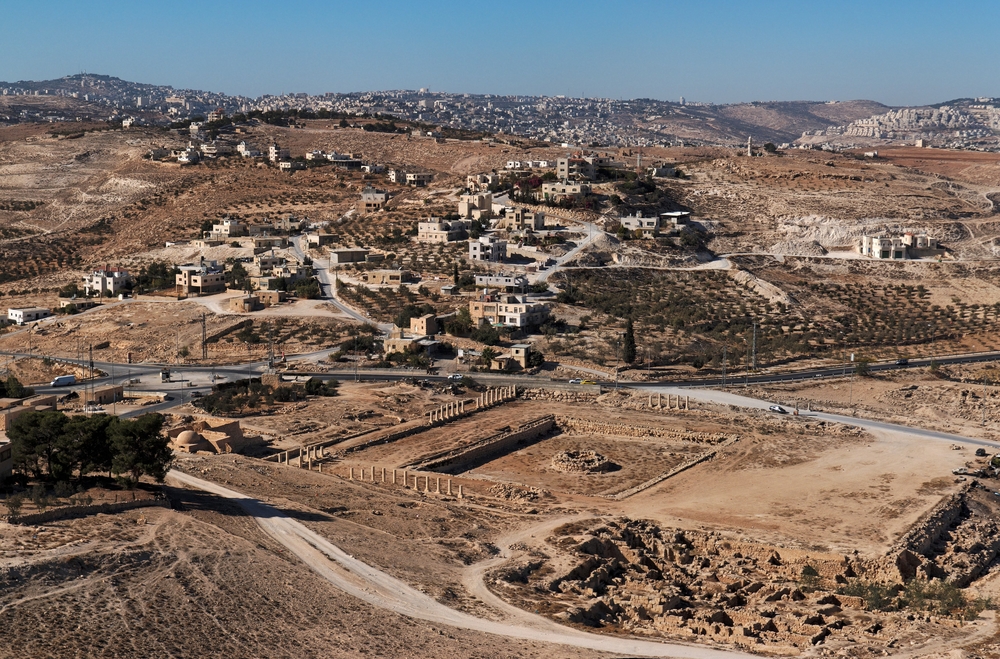Settlements and recognizing Israel as a Jewish state are symbolic of the distrust between Israelis and Palestinians.
The older of these two challenges resurfaced only recently in the now “suspended” negotiations between the two sides but, in fact, has been at the core of Israeli aspirations since the dawn of the Zionist movement in the late 19th century. Israelis want the Palestinians — and, indeed, the world — to recognize Israel as the nation state, or homeland, of the Jewish people. Without that, many Israelis reason, Israel can never be certain of Palestinian and broader Arab acceptance of Israel as a Jewish state in the Middle East.
The newer obstacle is the presence of Israeli settlements in the West Bank — Israel closed its settlements in Gaza in 2005. Settlements in the Golan are a matter with Syria. While Israeli forces have occupied the West Bank since the end of the 1967 war, Israeli settlement construction within those occupied areas did not begin until 1975.
The settlements may have been seen initially as temporary but, after nearly 40 years, their existence along with more than 500,000 settler residents is now viewed as effectively permanent, with some important exceptions. Nevertheless, Palestinians see Israel’s unwillingness to halt settlement expansion as evidence of its refusal to accept a viable Palestinian state.
In With the Old: Recognizing Israel as the Nation State of the Jewish People
Israel’s desire for recognition as a Jewish state has been articulated most forcefully only recently by Israeli Prime Minister Binyamin Netanyahu. It speaks to Israel’s need to be recognized by the Palestinians and their Arab neighbors as the state for Jews, a place that for the first time in nearly 2,000 years, Jews — regardless of where they may actually live in the world — may consider “our home” and live, pray and practice according to their faith without fear of persecution.
Recognizing Israel as the nation state for Jews means that the second exile, which followed the Jews’ unsuccessful revolt against the Roman Empire in 70 AD, cannot happen again. Israel as a Jewish state in the Middle East and home to the world’s Jews would be permanently recognized. Importantly, Netanyahu and others have promised that non-Jewish citizens of Israel, including its 21% Arab minority, will continue to enjoy full rights and protections as citizens of Israel.
Recognition by the Palestinians and other Arabs would also put to rest Israeli perceptions that their neighbors view the current state of Israel as just another temporary Western incursion in the region, much like the European “Kingdom of Jerusalem,” established after the Western victory of the first Crusades in 1099. That European incursion effectively ended with the surrender of the crusaders to Arab forces in Jerusalem under the leadership of Salah ad-Din in 1187.
Israeli distrust of Palestinian intentions is fundamentally rooted in the concern that any agreement struck without such recognition would be a temporary accommodation until such time as the Israelis, like the crusaders more than 825 years ago, were expelled. In this view, failure to recognize the Jewish state translates to failure to recognize the Jews’ inherent right to their state in the region.
Fundamentally, without strong leadership, the will to undertake painful compromises for peace and daring risk-taking, the trust equation in Middle East peace may be unsolvable for now.
But to Palestinians like Palestinian Authority (PA) President Mahmoud Abbas, aka Abu Mazen, such recognition presents special problems. Neither Egypt, nor Jordan, which signed peace agreements with Israel in 1979 and 1994 respectively, was asked to recognize Israel as a Jewish state.
Yielding something more than either of Abbas’ Egyptian and Jordanian counterparts could be viewed by Palestinians and the broader Arab public as too concessionary. He could not be sure that a peace agreement with such recognition would receive the support of Arab and non-Arab Muslim governments that he will assuredly need.
Abbas has also expressed concerns for Palestinians living in Israel. His concerns are less well-founded on this matter, however, given the repeatedly demonstrated protections of Israeli law extended, however imperfectly at times, to non-Jewish minorities. Nonetheless, a concession on this issue could easily be interpreted by uninformed West Bank and Gaza Palestinians as a “sellout” of the more than 1.5 million Palestinians in Israel.
Finally, and perhaps most importantly for Abbas, accepting Israel as a Jewish state would effectively foreclose the right of Palestinians anywhere to return to their homes in “historic Palestine” — present-day Israel. Until now, Palestinian negotiators have insisted on Israel’s recognition of this right of return, even if there was little expectation of many Palestinians doing so. Abbas, born in present-day Israel, has in the past indicated that he has no intention of returning to live in Israel. For Israel, however, recognition of this right of return would mean failure to accept Israel as a permanent Jewish state.
And In With the New: Accepting Settlements as Illegal
To nearly all Palestinians, the settlements in the West Bank stand as abject evidence of Israel’s unwillingness to accept a Palestinian state and of Israel’s alleged aim to reclaim all of Eretz Israel, or the “land of Israel,” extending to the Jordan River.
Settlements fuel the flame of distrust of Israel that burns in the heart of so many Palestinians and Arabs, and the reason for their suspicion of Israel’s intentions in Middle East peace talks. Palestinians have called for a suspension of any Middle East talks until Israel foregoes all further expansion of and development in West Bank settlements. How, they argue, can they negotiate the price of the pie when the other side keeps gobbling up more slices?
Practically speaking, settlements and the territorial administrative apparatus established after the Oslo Accords have deprived Palestinians of significant chunks of the West Bank for living and development.
Under the Oslo Accords, the PA retained administrative and security control only in Area A in the West Bank. In Area B, they were allowed administrative control, while the Israelis are responsible for security. In Area C, Israel has all effective control. What this has meant is that while actual built-up settlement areas in the West Bank probably occupy about 2% of West Bank land, the Palestinians cannot fully take advantage of more than 40% of the West Bank.
Israel has argued that rather than debate specific settlements and development suspensions, the sides should focus on borders — a key issue for Palestinians as well. Settle borders, say Israelis, and the settlement question goes away: what is east of the border is Palestinian and what is west is Israeli.
Israel’s concern over settlements, which are held by the United Nations as illegal and are not recognized by any government in the world, including the US, stems from domestic politics. Significant numbers of Israelis — some for religious reasons and others for political and/or security reasons — firmly hold that Israel is either entitled to or justified in keeping all or significant portions of the West Bank. Most of the 12 parties represented in the current Knesset support retaining all or most of the settlements in the West Bank, as do a number of members of Netanyahu’s cabinet.
Israeli prime ministers going back to Yitzhak Rabin have assured Israelis that any accord reached with the Palestinians would be submitted to a national referendum. And today, even the most pro-peace Israeli citizens probably accept and even support keeping at a minimum the largest settlements along the Green Line — the now all-but-forgotten line established under the 1949 Armistice separating Israeli and Arab lands. So, any concessions on settlements are sure to rankle significant numbers of Israelis.
Furthermore, closing settlements inevitably will mean relocating and compensating settlers who purchased homes and established lives there. Israelis remember painfully the evictions from and destruction of some 21 settlements in Gaza in 2005. The Israel Defense Forces (IDF) were called in to forcibly remove some of those settlers, making many Israelis enormously uncomfortable.
Additionally, closing the Gaza settlements and resettling their approximately 7,000 settlers was an expensive undertaking for the government and Israeli taxpayers — almost $900 million in compensation and relocation expenses. Resettling even 20% of the more than 500,000 settlers in the West Bank would be a costly and politically contentious nightmare for any Israeli government.
Most of the PA’s leadership and Palestinian negotiators concede that much of the settled areas will end up in Israel. However, they simultaneously insist that they must be compensated on a one-for-one basis and that the quality of received territory must be equal to that which they may transfer to Israel. The latter may be difficult since most of these settlements occupy prime land in the West Bank.
Secretary Kerry and Middle East Peace
In the failed negotiations between Israeli Prime Minister Ehud Olmert and President Abbas in 2008, the Israelis proposed retaining 6.3% of the West Bank as opposed to 1.9% offered by the Palestinians. Neither side seems willing to formally accept those figures today.
David Makovsky, previously with the Washington Institute for Near East Policy and now part of US Secretary of State John Kerry’s Middle East peace negotiations team, proposed in 2011 three viable scenarios that could conceivably bridge the divide. These scenarios offer concessions between 4.72% and 3.73%, allowing 80-68% of settlers to remain.
While several issues may account for the failure to reach even a framework agreement by the April 30 deadline of the nine-month period that Kerry had set for the negotiations, these two issues unquestionably lie at the center of the two sides’ profound distrust of the other. And distrust may have been what ultimately doomed the negotiations.
If the US administration pursues an extension of the negotiations — and, more importantly, if the sides agree — their time would be occupied with searching for a way to navigate through these two especially difficult obstacles. Ultimately, the newer challenge may be resolvable. But to address the older, thornier challenge of recognizing Israel as a Jewish state, Secretary Kerry will have to find a way to make it palatable to Abu Mazen and all Arabs.
In the past, that would have meant approaching the Palestinians’ closest allies, Egypt and Saudi Arabia, who traditionally have exerted considerable influence over the Palestinians and Abbas. Unfortunately, however, US leverage with both of these Middle East stalwarts is constrained. The US has riled the current Egyptian leadership by its recognition of the previous Islamist government, failure to reestablish close relations with the current military government, and a reduction in aid.
Saudi Arabia, meanwhile, is angry with US policy toward Egypt, failure to take action against Bashar al-Assad in Syria, and formal negotiations with the much loathed Islamic Republic of Iran. Moreover, both countries face significant challenges at home and are not as engaged on Middle East peace as they once were. Even the Arab League as recently as March reasserted its refusal to accept Israel as a Jewish state. Therefore, the task may be exceedingly difficult for Kerry.
Inability to satisfactorily address any one side of the trust equation renders the whole equation highly problematic. Fundamentally, without strong leadership, the will to undertake painful compromises for peace and daring risk-taking, the trust equation in Middle East peace may be unsolvable for now.
The priority ought to be accepting an approach that does not render the process dead in the water, which would lead to all kinds of sordid outcomes, including potential violence. Such an approach would concentrate for now on the core issues (borders, security, right of return and Jerusalem); use a plan similar to that proposed by Makovsky to address the borders-settlement question; and then, once each of these is satisfactorily addressed — and only then — take up the question of recognition of Israel as the Jewish homeland. Even this approach, however, would mean Netanyahu accepting the deferral and Abu Mazen conceding to discuss it as part of a final settlement, albeit at the end.
This effectively means kicking the can down the road — an unfortunate and tragic characteristic of Middle East peace negotiations dating back to 1979. What this approach might conceivably do, however, is begin to restore trust where virtually none currently exists. With trust, then, there may come will. And determined will, as we saw with Menachem Begin and Anwar Sadat in 1979, can find a way.
The views expressed in this article are the author’s own and do not necessarily reflect Fair Observer’s editorial policy.
Support Fair Observer
We rely on your support for our independence, diversity and quality.
For more than 10 years, Fair Observer has been free, fair and independent. No billionaire owns us, no advertisers control us. We are a reader-supported nonprofit. Unlike many other publications, we keep our content free for readers regardless of where they live or whether they can afford to pay. We have no paywalls and no ads.
In the post-truth era of fake news, echo chambers and filter bubbles, we publish a plurality of perspectives from around the world. Anyone can publish with us, but everyone goes through a rigorous editorial process. So, you get fact-checked, well-reasoned content instead of noise.
We publish 2,500+ voices from 90+ countries. We also conduct education and training programs
on subjects ranging from digital media and journalism to writing and critical thinking. This
doesn’t come cheap. Servers, editors, trainers and web developers cost
money.
Please consider supporting us on a regular basis as a recurring donor or a
sustaining member.
Will you support FO’s journalism?
We rely on your support for our independence, diversity and quality.











Comment